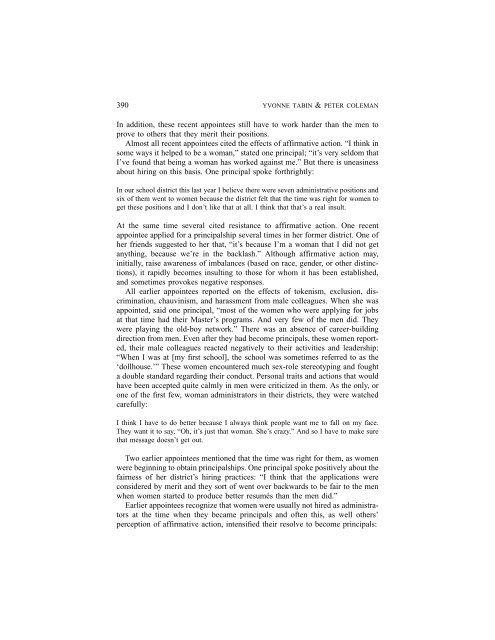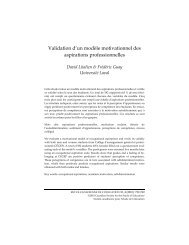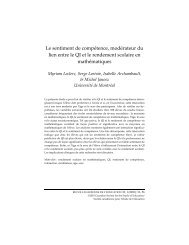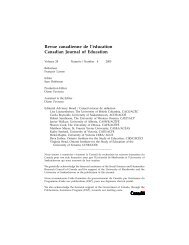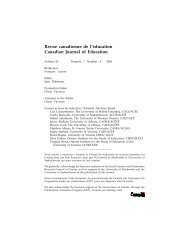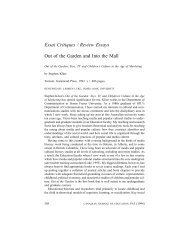Mireille Falardeau et Michel Loranger Le choix de stratégies ... - CSSE
Mireille Falardeau et Michel Loranger Le choix de stratégies ... - CSSE
Mireille Falardeau et Michel Loranger Le choix de stratégies ... - CSSE
You also want an ePaper? Increase the reach of your titles
YUMPU automatically turns print PDFs into web optimized ePapers that Google loves.
390 YVONNE TABIN & PETER COLEMAN<br />
In addition, these recent appointees still have to work har<strong>de</strong>r than the men to<br />
prove to others that they merit their positions.<br />
Almost all recent appointees cited the effects of affirmative action. “I think in<br />
some ways it helped to be a woman,” stated one principal; “it’s very seldom that<br />
I’ve found that being a woman has worked against me.” But there is uneasiness<br />
about hiring on this basis. One principal spoke forthrightly:<br />
In our school district this last year I believe there were seven administrative positions and<br />
six of them went to women because the district felt that the time was right for women to<br />
g<strong>et</strong> these positions and I don’t like that at all. I think that that’s a real insult.<br />
At the same time several cited resistance to affirmative action. One recent<br />
appointee applied for a principalship several times in her former district. One of<br />
her friends suggested to her that, “it’s because I’m a woman that I did not g<strong>et</strong><br />
anything, because we’re in the backlash.” Although affirmative action may,<br />
initially, raise awareness of imbalances (based on race, gen<strong>de</strong>r, or other distinctions),<br />
it rapidly becomes insulting to those for whom it has been established,<br />
and som<strong>et</strong>imes provokes negative responses.<br />
All earlier appointees reported on the effects of tokenism, exclusion, discrimination,<br />
chauvinism, and harassment from male colleagues. When she was<br />
appointed, said one principal, “most of the women who were applying for jobs<br />
at that time had their Master’s programs. And very few of the men did. They<br />
were playing the old-boy n<strong>et</strong>work.” There was an absence of career-building<br />
direction from men. Even after they had become principals, these women reported,<br />
their male colleagues reacted negatively to their activities and lea<strong>de</strong>rship:<br />
“When I was at [my first school], the school was som<strong>et</strong>imes referred to as the<br />
‘dollhouse.’” These women encountered much sex-role stereotyping and fought<br />
a double standard regarding their conduct. Personal traits and actions that would<br />
have been accepted quite calmly in men were criticized in them. As the only, or<br />
one of the first few, woman administrators in their districts, they were watched<br />
carefully:<br />
I think I have to do b<strong>et</strong>ter because I always think people want me to fall on my face.<br />
They want it to say, “Oh, it’s just that woman. She’s crazy.” And so I have to make sure<br />
that message doesn’t g<strong>et</strong> out.<br />
Two earlier appointees mentioned that the time was right for them, as women<br />
were beginning to obtain principalships. One principal spoke positively about the<br />
fairness of her district’s hiring practices: “I think that the applications were<br />
consi<strong>de</strong>red by merit and they sort of went over backwards to be fair to the men<br />
when women started to produce b<strong>et</strong>ter resumés than the men did.”<br />
Earlier appointees recognize that women were usually not hired as administrators<br />
at the time when they became principals and often this, as well others’<br />
perception of affirmative action, intensified their resolve to become principals:


